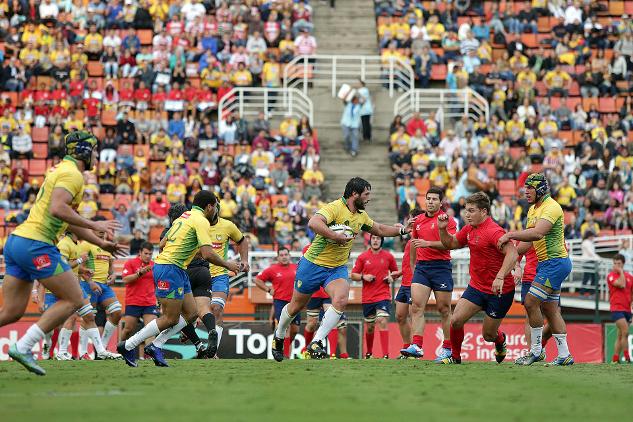
Brazilian rugby is enjoying a new era, and one that extends beyond the boundaries of South America.
Until November Brazil had never toured outside of the region but they are now heading off on their travels again, less than four months after their three-week tour of Europe which produced back-to-losses to Germany and a narrow defeat to Portugal, for their second-round encounter against USA in the Americas Rugby Championship.
Having seen off Chile on home soil in Sao Paulo, Brazil take on the Eagles in Houston, Texas, on Saturday 11 February. Os Tupis return to South America in the weeks that follow, to play Uruguay in Punta del Este, Argentina XV in Ushuaia and, finally, they’re at home to Canada in Sao Paulo.
Covering such distances takes some getting used to, admits Brazil’s Argentinean-born head coach Rodolfo Ambrosio, who has been in charge of the team for just over two years.
“It is all about adjusting to this new rugby, we need time. When we toured Europe in November it showed that players were not accustomed to being away for so long,” he said.
STICKING TO THE SCRIPT
While Brazil may have returned home from their November trip without a win to their name, Ambrosio says the lessons learnt on mainland Europe served them well leading into last weekend’s 17-3 victory over Chile.
“We were patient and stuck to the script,” observed Ambrosio. “We gave them no scoring opportunities and we took ours. Yet, I am not entirely happy with our performance; we must continue to grow. This is not enough to fulfill our goals.”

Brazil’s ultimate goal is to qualify for their first Rugby World Cup, not in Japan in 2019 but four years later, in 2023.
Developing the younger players and exposing them to new challenges is seen as key to achieving this aim.
“If we give young players, aged 19 and 20, opportunities now for them to grow and mature, they’ll be ready for the next qualifying process in four years’ time,” Ambrosio pointed out.
YOUTH AND EXPERIENCE
Ambrosio’s team is a positive blend of experienced and young players. Flanker Joao da Ros, number eight and captain Nick Smith (pictured), lock Diego López and replacement hooker Daniel Danielewicz, who at 35 will retire at the end of the ARC after a superb contribution to his country, are mentoring a young crop of forwards that includes a batch of young front-rowers, none older than 23.

In the backs, Moisés Duque is the old-stager at only 28, new cap Joshua Reeves is 25 and the rest are younger.
Former Italian international Ambrosio has developed the project everybody in Brazil hopes will lead to qualification for RWC 2023.
“It took me almost half a year to have a diagnosis, to understand Brazilian rugby and polish the language. I then produced a structure that adapted to the current scenario in a country with economic problems.”
BIG COUNTRY, BIG REWARDS
Despite the clear growth, there are only five High Performance centres in four of the 24 national states: two in Sao Paulo – in the city and Sao José dos Campos, with the other three in Florianópolis (State of Santa Catarina), Bento Gonçalves (Río Grande do Sul) and Curitiba (Paraná).
The size of Brazil, the fifth-largest country in the world, makes rolling out the programme further geographically challenging.
But Ambrosio is pleased with the way that those that are involved have embraced the demands placed upon them.
“Players are now accustomed to what high performance entails; they were not that committed when I started.”
This commitment has brought big rewards. When Ambrosio arrived in Brazil at the end of 2014, Os Tupis were at 45th in the World Rugby Rankings. They are now 34th.
“Our ranking has improved but not as much as I would have wanted it to. Maybe if we had played against Germany, Portugal and even Kenya with the team we used in the ARC, we could be even higher,” he said.
“Upward movement in the rankings is a validation that what we are doing is working but it needs to be taken in context; it has to relate to a meaningful growth of the team.
“We are now facing higher-ranked teams all the time, so even if we want to keep an eye on the rankings, the value of growth will be reflected by how many players we have, how many train and how they understand high performance.”
MOVING FORWARD
Rugby is now a recognised sport in Brazil. The road is long, but it is moving forward. Playing in tournaments such as the Americas Rugby Championship certainly helps.
The next challenge, though, comes in the shape of a USA side out for revenge after losing to a last-gasp kick in the same fixture a year ago.
“They will be hard…very hard,” said Ambrosio. “They are more experienced, stronger and play better.
“Every team in the ARC is better than us so we mmust continue to grow. What is important is that are moving forward all the time.”
[Source:-Boxcore]
